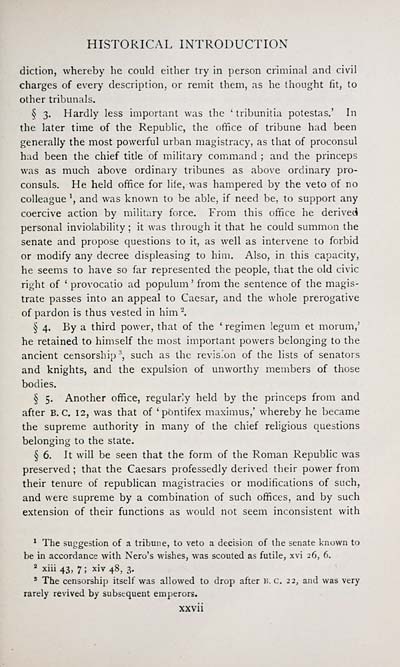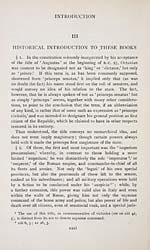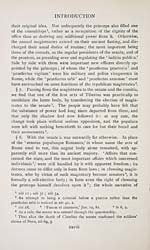Download files
Complete book:
Individual page:
Thumbnail gallery: Grid view | List view

HISTORICAL INTRODUCTION
diction, whereby he could either try in person criminal and civil
charges of every description, or remit them, as he thought fit, to
other tribunals.
§ 3. Hardly less important was the ' tribunitia potestas.' In
the later time of the Republic, the office of tribune had been
generally the most powerful urban magistracy, as that of proconsul
had been the chief title of military command ; and the princeps
was as much above ordinary tribunes as above ordinary pro-
consuls. He held office for life, was hampered by the veto of no
colleague \ and was known to be able, if need be, to support any
coercive action by military force. From this office he derived
personal inviolability ; it was through it that he could summon the
senate and propose questions to it, as well as intervene to forbid
or modify any decree displeasing to him. Also, in this capacity,
he seems to have so far represented the people, that the old civic
right of ' provocatio ad populum' from the sentence of the magis-
trate passes into an appeal to Caesar, and the whole prerogative
of pardon is thus vested in him I
§ 4. By a third power, that of the ' regimen legum et morum,'
he retained to himself the most important powers belonging to the
ancient censorship^, such as the revision of the lists of senators
and knights, and the expulsion of unworthy members of those
bodies.
§ 5. Another office, regularly held by the princeps from and
after B.C. 12, was that of 'pbntifex maximus,' whereby he became
the supreme authority in many of the chief religious questions
belonging to the state.
§ 6. It will be seen that the form of the Roman Republic was
preserved ; that the Caesars professedly derived their power from
their tenure of republican magistracies or modifications of such,
and were supreme by a combination of such offices, and by such
extension of their functions as would not seem inconsistent with
' The suggestion of a tribune, to veto a decision of the senate known to
be in accordance with Nero's wishes, was scouted as futile, xvi 26, 6.
' xiii 43, 7 ; xiv 48, 3,
' The censorship itself was allowed to drop after K. c. 22, and was very
rarely revived by subsequent emperors.
xxvii
diction, whereby he could either try in person criminal and civil
charges of every description, or remit them, as he thought fit, to
other tribunals.
§ 3. Hardly less important was the ' tribunitia potestas.' In
the later time of the Republic, the office of tribune had been
generally the most powerful urban magistracy, as that of proconsul
had been the chief title of military command ; and the princeps
was as much above ordinary tribunes as above ordinary pro-
consuls. He held office for life, was hampered by the veto of no
colleague \ and was known to be able, if need be, to support any
coercive action by military force. From this office he derived
personal inviolability ; it was through it that he could summon the
senate and propose questions to it, as well as intervene to forbid
or modify any decree displeasing to him. Also, in this capacity,
he seems to have so far represented the people, that the old civic
right of ' provocatio ad populum' from the sentence of the magis-
trate passes into an appeal to Caesar, and the whole prerogative
of pardon is thus vested in him I
§ 4. By a third power, that of the ' regimen legum et morum,'
he retained to himself the most important powers belonging to the
ancient censorship^, such as the revision of the lists of senators
and knights, and the expulsion of unworthy members of those
bodies.
§ 5. Another office, regularly held by the princeps from and
after B.C. 12, was that of 'pbntifex maximus,' whereby he became
the supreme authority in many of the chief religious questions
belonging to the state.
§ 6. It will be seen that the form of the Roman Republic was
preserved ; that the Caesars professedly derived their power from
their tenure of republican magistracies or modifications of such,
and were supreme by a combination of such offices, and by such
extension of their functions as would not seem inconsistent with
' The suggestion of a tribune, to veto a decision of the senate known to
be in accordance with Nero's wishes, was scouted as futile, xvi 26, 6.
' xiii 43, 7 ; xiv 48, 3,
' The censorship itself was allowed to drop after K. c. 22, and was very
rarely revived by subsequent emperors.
xxvii
Set display mode to: Large image | Transcription
Images and transcriptions on this page, including medium image downloads, may be used under the Creative Commons Attribution 4.0 International Licence unless otherwise stated. ![]()
| Early Gaelic Book Collections > Matheson Collection > Cornelli Taciti annalium > (31) |
|---|
| Permanent URL | https://digital.nls.uk/76567296 |
|---|
| Description | Items from a collection of 170 volumes relating to Gaelic matters. Mainly philological works in the Celtic and some non-Celtic languages. Some books extensively annotated by Angus Matheson, the first Professor of Celtic at Glasgow University. |
|---|
| Description | Selected items from five 'Special and Named Printed Collections'. Includes books in Gaelic and other Celtic languages, works about the Gaels, their languages, literature, culture and history. |
|---|

